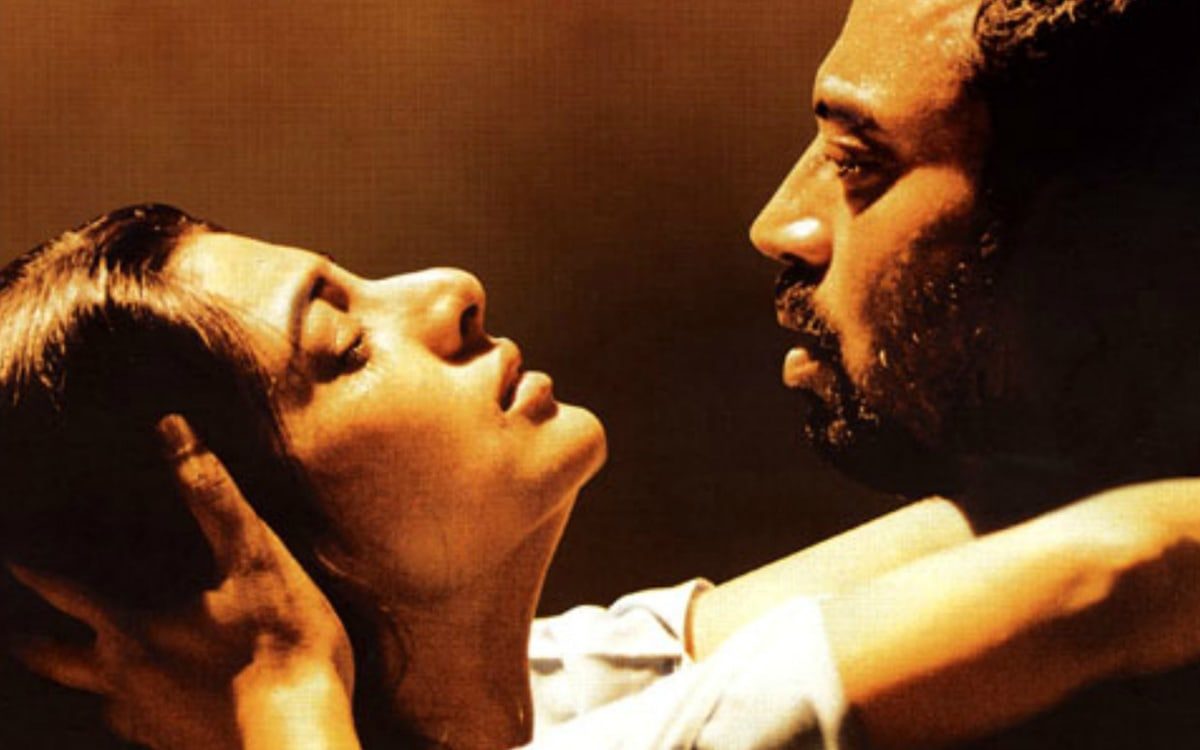Maqbool by Vishal Bhardwaj (Review)

As the audience was getting situated in the theatre, it was announced that we would be seeing Maqbool’s world premiere. Of course, that got the crowd going wild (or at least as wild as a festival crowd not seeing Ong-Bak is wont to get). The film’s producer, Bobby Bedi, and director, Vishal Bharadwaj, made the announcement, noting that, aside from them, we would be the first people to see the completed film. Not even the film’s leading man, Irfan Khan, who arrived later that night, had seen the film in its entirety yet.
Bedi and Bharadwaj were noticeably anxious, and hoped that everyone would enjoy the film. Based on the audience’s reaction during and after the film, it’s safe to say their anxiety was unfounded. The crowd didn’t just enjoy the film. We loved it.
With Maqbool, Bharadwaj (who also co-wrote the screenplay and composed the film’s music) has taken a classic piece of Western literature (Shakespeare’s Macbeth) and put a distinctly Indian spin on it, adapting it to both a new culture and a new age. The result made for one of the most engrossing moviegoing experiences I had at the festival, and possibly all year.
Maqbool (Khan) is the favored lieutenant of Abbiji, a Godfather-like figure who runs the Indian underworld. Maqbool is completely loyal to Abbiji, even resisting the advances of the sultry Nimmi, Abbiji’s mistress (and the movie’s Lady Macbeth). It’s hinted that the two have a past of sorts, but Maqbool adamantly refuses to betray his boss. That is, until two corrupt police officers named Pandit and Purohit (who take the place of Macbeth’s witches, and who also provide much of the movie’s comic relief) predict that Maqbool will soon take Abbiji’s place.
With that prophecy looming before him, Maqbool begins growing discontent with his place in the gang, especially when Abbiji makes several decisions not to his liking. Driven by his newfound ambition and Nimmi’s seduction, Maqbool decides to make his move.
Of course, anyone who has been in a 9th grade English class can assume what happens. After Abbiji’s murder, the gang splinters and the power that Maqbool thought was so firmly within his grasp begins to slip from it. He is tortured by disturbing visions and grows paranoid, slaughtering both friend and foe to achieve his ends. In one of the film’s most chilling scenes, Nimmi announces that she’s pregnant and Maqbool, with a hint of madness in his eyes, casually wonders how long it’d been since Nimmi last slept with Abbiji. The unspoken menace within that scene is palpable, and Nimmi’s horrified reaction is gutwrenching. Nimmi herself is slowly going mad with guilt and is tortured by visions of her own, which make for some memorable “Damned spot!” moments.
This being a Bollywood film, there were several musical numbers sprinkled throughout. Compared to what little Bollywood I’ve seen, where characters suddenly burst into song and dance for seemingly no reason, Maqbool’s musical numbers are integrated incredibly well into the film’s structure (i.e., taking place during religious ceremonies and weddings), which lends credence to them without taking away any of their exotic appeal. And it certainly doesn’t hurt that the music is incredibly catchy as well. There were many times where I found myself nodding and tapping my feet along with the songs, and it wouldn’t have surprised me in the least had members of the audience suddenly leapt to their feet and started dancing along.
But Bharadwaj expertly balances such festive and enjoyable scenes with ones that are quite gritty and shocking, creating a tone comparable to Scorcese’s movies. (Not surprisingly, Bharadwaj mentioned Scorcese as an influence in the Q&A following the film.) The opening scene, where the two corrupt policemen interrogate a prisoner, ends in a splatter of blood that would make Tarantino proud, and the cycle of violence and betrayal continues to escalate as the film continues.
One thing that struck was that, given the amount of violence in the film, we actually see very little bloodshed. Oh, there is blood spilled, but nowhere near the bucketfuls you’d see if this had been an American film. Bharadwaj never glorifies the violence, nor does he resort to cheap, exploitative tricks to get the audience’s adrenaline pumping. His film, while very stylish and modern, is far more mature and intelligent than that; he focuses, not on the violence itself, but rather on its tragic effects.
Even though Maqbool is the movie’s villain, a man whose insecurities and ambitions prove to be his undoing, Khan plays him as a very deep, layered character and not some megalomaniac. His downward slide is seen not without sympathy and pity, even when you recoil at the horrible things he does to consolidate his power. Khan’s performance was riveting to watch, and when he was introduced, the audience let him know that. And the rest of the performances are incredible as well, from Tabu’s performance as the conniving yet passionate Nimmi, to the dominating Abbiji, to the two actors portraying the bumbling cops/fortunetellers.
I watched many of the films at the fest with rather critical eyes (except for Ju-On, where my eyes were simply covered most of the time). But any critical view was stripped away during Maqbool. I completely lost myself within this film. Everything about this film just worked for me, such that the film’s 2 hours (short by Bollywood standards) just flew by in a blaze of betrayal and passion.
Maqbool is a brilliant film, and I would love to see a distributor get its domestic rights (other than Miramax, that is). Maqbool could be a great crossover film. Its story is familiar enough to most Westerners (after all, who hasn’t heard of Shakespeare and Macbeth?), but the way in which it tells the story has enough of an exotic, non-Western twist that it could easily open people’s eyes to a whole new realm of world cinema.
